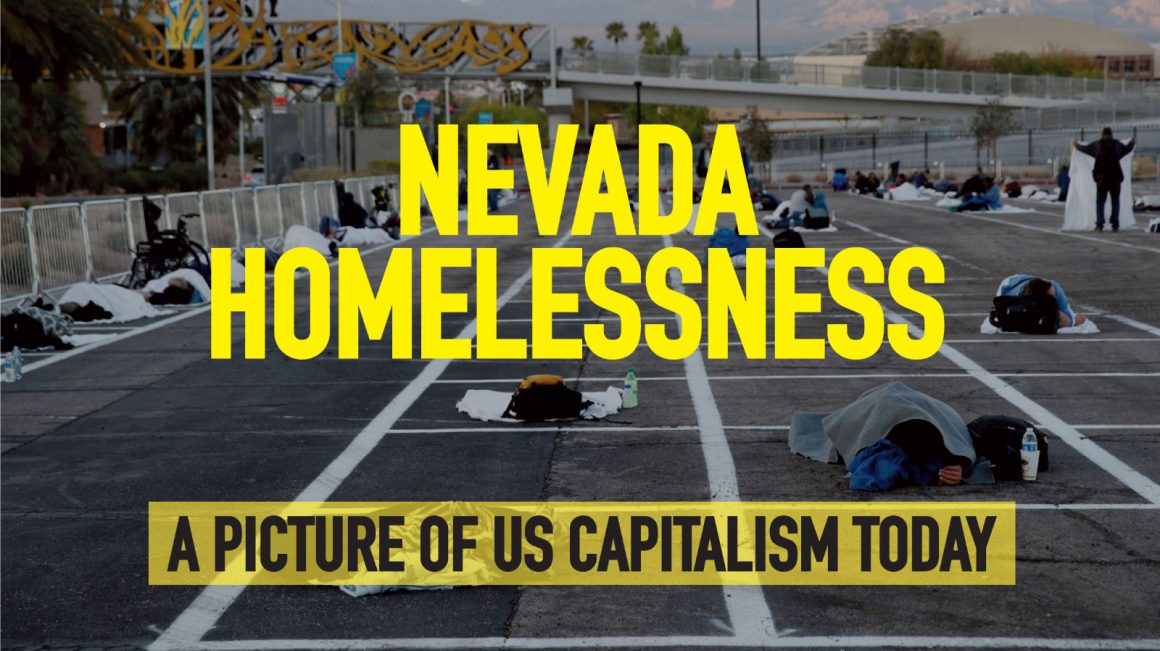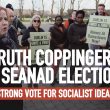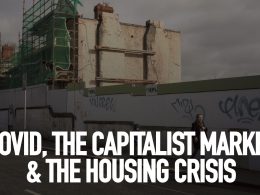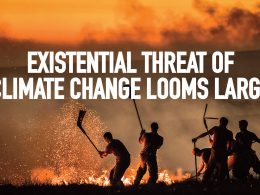By Harper Cleves
In the last weekend of March, images of a parking lot converted into a homeless shelter in Las Vegas, Nevada sparked outrage. The images of the make-shift shelter are stark and are illustrative of the grotesque inequalities that lie at the heart of US capitalism.
Human beings lie directly on asphalt, or on thin blue foam sheets with light blankets draped over them. Each ‘bed’ is separated by drawn white squares in an attempt for people to adhere to the physical-distancing standard of two-metres. In one photo, a wheelchair can be seen on the left side of the frame parked next to a figure lying on the ground. This make-shift shelter sprung up following the closure of a 500-bed homeless shelter in the city when one of the clients tested positive for Covid-19. Overlooking the parking lot are some of the many empty hotels, with 150,000 available beds.
The backdrop of Nevada’s housing crisis is significant. Clark County, home to Las Vegas, has the fourth highest number of unaccompanied homeless youth in the country. Nevada also has the fourth-highest population of unsheltered homeless in the nation. In a 2019 census, Southern Nevada recorded 5,520 homeless, 40% of these unsheltered. 45% of those reported are experiencing homelessness for the first time. The fastest-growing demographic experiencing homelessness is families with children, many of whom are single-mother households.
Rising unemployment and cost of living
The top cause of homlessness in Nevada is lost jobs and unemployment. Furthermore, a shocking 44% of respondents to the 2019 census reported additional disabling factors that make it difficult to find housing, with 67% reporting an expensive physical medical condition. The Nevada Homeless Alliance also argues that high rents, moving costs, lack of available housing and lack of access to private or public transport are major factors in the ability to access housing in the state.
Nevada has the greatest shortage of affordable housing in the United States, with only 19 available affordable units per every 100 extremely low income households. 79% of low income families are severely cost-burdened by rents. It is estimated that in order to afford the monthly rent of an average 2-bedroom apartment in Nevada ($980), individuals would need to make $39,198 annually – which is an hourly rate of $18.85 for a person working 40 hours per week. The minimum hourly wage in the state of Nevada is currently $8.25.
Wealth inequality
A study conducted by Guinn Brookings in 2018 highlighted the fact that while Nevada had one of the fastest-growing economies in the United States, it still had not recovered to the pre-2008 recession levels of prosperity and that the wage increases that have been reported have been unevenly distributed. Most workers are still concentrated in gaming and tourism and accomodation and food services; all lines of work with high levels of precarity, especially in the context of this unprecedented pandemic.
The homelessness rates in Nevada and the understandable outrage caused by sheltering vulnerable populations in parking lots, is the direct result of a system that places private profit above public need. The story of housing precarity and homelessness in Nevada is a story of criminally-low minimum wages, high costs of medical care, precarious private-sector work, and low public investment.The response from the Department of Housing to homelessness in the state was to throw $16 million in grant money to a handful of homelessness shelters. While undoubtedly those working at the shelters could use the funds, this fails to address the central issue, which is scandalously low access to affordable housing. The federal government’s failure to invest in public housing represents their fundamental unwillingness to cut into private profit in the housing market, even at the expense of growing numbers of vulnerable families and children.
Desire for change
It is no accident that in this context the programme of Bernie Sanders, which calls for Medicare-for-all, a $15 minimum wage (including for undocumented workers), and taxation of billionaires struck a chord in Nevada, where Sanders didn’t just win with voters under the age of 30, but also among men, women, Latino voters, voters aged 45-64, and voters with and without college degrees.
Millions in the United States and globally are questioning the capitalist system that created the conditions for this crisis, and are looking for alternatives that would provide for human need rather than corporate greed. There is growing support for the idea of socialism as being such an alternative, even if there is still a relatively vague understanding of what this means. To bring such an alternative into being means ending the rule of capitalism and taking society’s wealth into public ownership in order to plan the economy democratically to meet the needs of the majority rather than the profits of a tiny elite.












